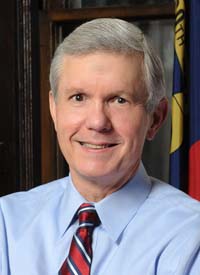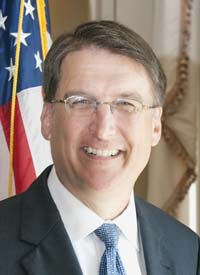Ask the Candidates
We ask the candidates for North Carolina’s governor to respond to issues that affect you.
The North Carolina Association of Electric Cooperatives asked the two major candidates for governor questions that are important to electric cooperatives and the communities they serve.
Walter Dalton
Q Currently, North Carolina has one of the highest unemployment rates in the nation. Rural North Carolina counties began to struggle before other parts of the state and continue to experience an unemployment rate higher than the statewide average. What is your plan to improve employment opportunities in rural North Carolina?
A As a product of rural North Carolina, creating jobs for our entire state will be a top priority as governor. For 30 years, I represented a rural electric co-op, so I know the value of these member-owned companies.
My background gives me a unique perspective on creating rural jobs. That's why I worked to create the Rural Infrastructure Fund with the Rural Center to fund water, sewer and economic development grants. That's also why I oppose cuts to this program by the legislature.
In addition, we can retrain our workforce for jobs in health services. Baby boomers are getting older, and jobs exist for nurses, nurses' assistants, rest home workers and other health professions. Bio-manufacturing is growing rapidly, and rural areas are well-suited for this economy. We must also encourage entrepreneurship and attract more military contracts.
I have worked to align our "early colleges," which I helped create, with today's workforce needs. Finally, as chair of the New Generation Initiative, I am working with the Rural Center to encourage young people to create businesses in rural areas.
Keeping our taxes fair, job recruitment active, and our community colleges strong will be the keys to building jobs for the future.
Q All electric service providers, including electric cooperatives, in the state face an era of rising electric rates because of the need for new generation, transmission and distribution, increased regulations, and changing consumer expectations. What plans do you have to address these challenges?
A Rural areas deserve high-speed broadband and, with it, all residents will become part of the "smart grid" and save countless dollars. We also need to pursue alternative fuels, and rural counties can lead in finding the solutions. The North Carolina Biofuels Center is working on generating energy from swine waste, switchgrass, kudzu and algae, and wind and solar are options as well.
Q Locally owned and governed electric cooperatives do much more than deliver electricity; they actively work to improve the quality of life in the communities they serve through economic and community development projects. As governor, how will you seek the input of electric cooperatives as you encounter issues that impact the lives of those living in the rural areas of the state?
A As the former attorney for a co-op, I know that they improve citizens' lives and recruit jobs to areas that need them the most. Nobody likes big government, but the Rural Electrification Act is good government, improving the quality of life and economic development for rural areas. Electric co-ops form the backbone of our rural economy, and we would not be able to create jobs without the Rural Electrification Act.
The rural co-ops will be integral to my job creation and economic planning. I know your statewide leaders, and they will have a seat at the policy table. I will invite the co-ops to help host town hall meetings in their service areas so government can learn issues facing rural residents. I also hope to partner with the co-ops to expand access to its rural loan programs.
Pat McCrory
Q Currently, North Carolina has one of the highest unemployment rates in the nation. Rural North Carolina counties began to struggle before other parts of the state and continue to experience an unemployment rate higher than the statewide average. What is your plan to improve employment opportunities in rural North Carolina?
A North Carolina now has the fifth highest unemployment rate in the country and 43 straight months of 9 percent unemployment — it is clear that we need new leadership and vision in the governor's office. To start a North Carolina comeback, we must strengthen our rural areas that have been hit hard during this economic downturn. Economic and job growth in only a few cities won't be enough to turn our state around.
Fixing North Carolina's economy and turning around our state's high unemployment rate must be the top priority of our next governor. We must be a state that grows, builds and produces things, as opposed to a service economy that just buys things. To do this, we must start with tax reform that lowers corporate and personal income taxes to make North Carolina more competitive with its neighbors, reduce regulations to make government more responsive to business, develop a long-term transportation and infrastructure plan to remove politics from funding decisions, and take an "all-of-the-above" approach to energy and energy exploration to help power the economy with low-cost, reliable energy. My plan specifically targets agribusiness as an industry that we can help strengthen through an "ExportNC" initiative to get North Carolina's products to the world, vocational education to train the next generation of farmers, and support for agricultural research and extension.
Q All electric service providers, including electric cooperatives, in the state face an era of rising electric rates because of the need for new generation, transmission and distribution, increased regulations, and changing consumer expectations. What plans do you have to address these challenges?
A Ensuring low cost, reliable sources for energy is one of the most important economic development goals we can have as a state. As governor, I will pursue an "all-of-the-above" energy and energy exploration strategy that will help ensure we have low-cost, reliable energy, while not burdening electric cooperatives with harmful regulations. My plan to fix the economy calls for eliminating and/or combining missions for redundant commissions and committees to further streamline government. As governor, I will also fight unnecessary and burdensome mandates, taxes and regulations from the federal government.
Q Locally owned and governed electric cooperatives do much more than deliver electricity; they actively work to improve the quality of life in the communities they serve through economic and community development projects. As governor, how will you seek the input of electric cooperatives as you encounter issues that impact the lives of those living in the rural areas of the state?
A To ensure the North Carolina comeback is a success, we must recruit the best people to work in state government and have competent managers with private-sector experience in our government agencies. If elected, I will seek the input of industry leaders, especially on the utilities board, while hiring and consulting top-notch professionals with varying backgrounds to ensure we bring real-world experience to a McCrory administration.

-
Share this story:

 Walter H. Dalton, Democrat
Walter H. Dalton, Democrat Patrick L. McCrory, Republican
Patrick L. McCrory, Republican